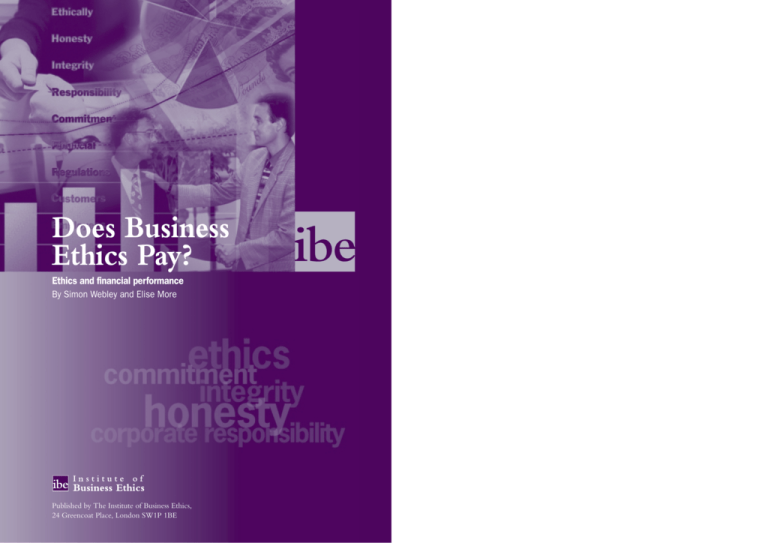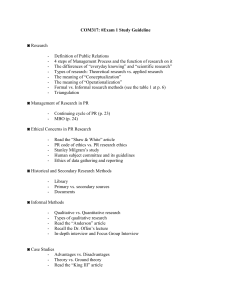
Does Business
Ethics Pay?
Ethics and financial performance
By Simon Webley and Elise More
Published by The Institute of Business Ethics,
24 Greencoat Place, London SW1P 1BE
DOES BUSINESS ETHICS PAY?
DOES BUSINESS ETHICS PAY?
Contents
Page
Authors
6
Acknowledgements
6
Forewords
7
BP
LloydsTSB
ExxonMobil
Executive Summary
Chapter
Chapter
Chapter
Chapter
Chapter
All rights reserved. No part of this book may be reproduced or transmitted in
any form or by any mean, electronic or mechanical, including photocopying,
recording or by any information storage and retrieval system, without
permission in writing from the publisher.
Permission to use short quotations will normally be given provided the source
is acknowledged.
1 Introduction: do business ethics matter?
2 Research methodology: how it was done
3 What does the research tell us?
4 A summary of some related research
5 Some conclusions from this research
Appendix 1. Glossary and sources
Appendix 2. A technical note on financial measures used in this study
Appendix 3.
Appendix 4.
by Professor Roy Batchelor
US study: article by Dr. Curtis C. Verschoor
Note on profitability
Publications of the Institute
9
11
16
23
29
32
34
36
40
46
47
Does Business Ethics Pay?
ISBN 0 9539517 31
© IBE
First published April 2003
by the Institute of Business Ethics
24 Greencoat Place
London SW1P 1BE
A list of publications that have resulted from our research, surveys, conferences,
seminars is given at the back of this publication. The IBE’s website
(www.ibe.org.uk) is regularly updated and provides information on events and
other aspects of the Institute’s work.
4
5
DOES BUSINESS ETHICS PAY?
DOES BUSINESS ETHICS PAY?
Executive Summary
With 80,000 employees, one million shareholders, and 15 million customers not to mention countless suppliers, competitors and the community in which
our business is rooted - we have a lot of stakeholders.
But writing a code is the easy part and the real challenge is to ensure its
adoption across the company by everyone in the company in daily business
situations. Publication and circulation to all employees, use of the company
Intranet, employee training and feedback, awareness raising and compliance
monitoring have all been part of the continuous effort.
With corporate ethics under the spotlight as never before, the demands on
companies to be more open, transparent and accountable are increasing. The
Company Law Review in The UK, the Sarbanes-Oxley Act in the US and the
development of the Corporate Social Responsibility agenda throughout
Europe are all expressions of the pressure for greater regulation in this area.
Summary
Does business
ethics pay?
‘Does business ethics pay?’ is a question that some would say is a wrong one.
Behaving ethically, they argue, is what you do because it is the right thing to do.
Nevertheless, there is a continuing requirement for reliable indicators to
measure the performance of corporations in the non-financial areas of a
business and to link these to business success. Concepts such as integrity and
fairness are, however, generally only measurable using indirect indicators.
This study was undertaken to explore some indicative measures of a commitment to
ethics/corporate responsibility and then to compare them against financial
performance measures over a period of four years. In this way, the research set out to
investigate whether it can be shown that a commitment to business ethics does pay.
But, for Lloyds TSB, it is not just a question of doing what is expected. It is a
question of doing what is right. And all our evidence shows us that doing
what is right also makes good business sense. That is why we have supported
this research - because we believe that ethics does pay.
For this research, seven indicators were chosen - four of corporate financial
performance [Market Value Added (MVA), Economic Value Added (EVA), Price
Earnings Ratio (P/E) and Return on Capital Employed (ROCE)] - and three of
corporate responsibility [having a code of ethics, ratings for managing socio/ethical risks
and being cited consistently in the annual list of Britain’s Most Admired Companies].
David Pritchard,
Group Executive Director
Lloyds TSB
ExxonMobil
We strive to achieve superior financial and operating results while adhering to the
highest standards of business conduct. Our ethics policy, like all of our policies, is
clear-cut, straightforward and applies to everyone without exception.
The strength of any policy lies in how well it is implemented. At ExxonMobil,
we not only test the effectiveness of our ethics policy, we also ensure that
proven management control systems are in place throughout our operations.
While we continue to improve upon these systems, they provide the basic
framework for ensuring operational excellence throughout our company. We
believe that a disciplined approach to managing the business is good business.
As a founding supporter of the IBE, we welcome the opportunity to be one of the
sponsors of this study. We have long recognised the importance and value of
business integrity and strongly support the IBE in its efforts to encourage all British
companies, large and small, to adopt the highest standards of business behaviour.
Integrity is the primary principle on which we base our corporate citizenship
commitments to the communities, customers, shareholders and employees
wherever we operate worldwide. It is a sad fact that people today are less
trusting of business than they have been for a long time. This is why values
such as integrity and honesty have to be at the heart of business. There can be
no place, certainly not in our company, for those who do not live by them.
Gordon Sawyer
UK Public Affairs Manager
Esso UK Limited
An ExxonMobil subsidiary
8
The sample consisted of between 41 and 86 companies taken from the FTSE 350
for which full and comparable company data was available for the years 1997-2001.
It was divided into two cohorts: those who have had codes of ethics/conduct/
principles for five years or more and those who explicitly said they did not.
At ExxonMobil, the means by which we achieve our results are just as
important as the results themselves.
Findings
Findings
A review of similar research shows that the relationship between good financial
performance and other indicators of corporate responsibility (environmental
management, corporate social responsibility, sustainability etc.) is positive but
not definitive. However, Verschoor’s work in the US, on whose methodology
this research is based, showed that there was superior MVA in companies which
referred to their ethics’ programmes in the annual report, compared with those
who did not.
Before testing the validity of Verschoor’s conclusion for the UK, this study
sought to find out whether or not the presence of a code of ethics could be
used as an indicator of a genuine commitment to ethics. Good practice for a
sample of UK companies with and without a code was tested by looking at a) a
rating for risk management and b) a peer evaluation which included, for
example, competent management, financial soundness and quality of goods and
services. A positive relationship was found. Having an accessible code of ethics
was then used to investigate the relationship between ethical commitment and
financial performance over the four year period.
financial performance, from three of the four measures of
• Regarding
corporate value used in this study (EVA, MVA and P/E ratio) it was found
that those companies in the sample with a code of ethics had, over the
period 1997-2001, out performed a similar sized group who said they did
not have a code.
9
DOES BUSINESS ETHICS PAY?
DOES BUSINESS ETHICS PAY?
1. Introduction: Do Business Ethics Matter?
with a code of ethics generated significantly more Economic
• Companies
Value Added (EVA) and Market Value Added (MVA) in the years
1997 - 2000, than those without codes.
with a code of ethics experienced far less P/E ratio volatility over a
• Companies
four year period, than those without them. This suggests that they may be a
more secure investment in the longer term. Other research has suggested that a
stable P/E ratio tends to attract capital at below average cost; having a code
may be said to be a significant indicator of consistent management.
indicator that showed a different result pattern to the others was Return
• The
on Capital Employed. No discernable difference was found in ROCE
between those with or without a code for 1997-98. However, from 1999 to
2001 there was a clear (approximately 50%) increase in the average return of
those with codes while those without a code fell during this period.
data also indicates that in the years 1997–2001, those with an explicit
• The
commitment to doing business ethically have produced profit/turnover ratios
at 18% higher than those without a similar commitment (see note on
profitability in Appendix 4).
general conclusion from this study is that there is strong evidence to
• The
indicate that larger UK companies with codes of ethics, e.g. those who are
explicit about business ethics, out-perform in financial and other indicators
those companies who say they do not have a code. Having a code of business
ethics might, therefore, be said to be one hallmark of a well managed company.
Introduction
If it were possible to produce evidence that companies which are explicit about
their commitment to doing business ethically perform better over the longer
term than those that do not, it might help to convince more business leaders
that it is a worthwhile thing to do – as well as the ‘right’ thing to do.
The management expert, Peter Drucker, is quoted as saying “What cannot be
measured, cannot be managed.” Measurement of the measurable is clearly
worthwhile if management is to be effective. There are aspects of business
which whilst notoriously difficult to measure accurately, do need to be
managed. While some aspects of corporate responsibility are clearly susceptible
to measurement – progress toward environmental management and
enhancement is an example – many others are not. Business ethics
programmes are one of these. Sometimes referred to as the soft areas, they are
best approached by looking for indicators of ‘tendency’ or ‘direction’ rather
than absolute numbers. In addition, some things can only be measured by
their effects.
Corporate officers sometimes question if not actually veto, spending on
programmes which cannot be shown to yield a benefit to the ‘bottom line’.
On the other hand, many chief executive officers and boards of directors are
conscious of areas of business activity not susceptible to measurement, but
which if not addressed, leave the organisation vulnerable. Their problem is
that good policies aimed at lowering risk but which incur cost, are difficult to
make convincing because they can only be justified by negative criteria
e.g.: “we did not have a fire” or “our integrity was not breached”.
An example of this is corporate safety policy, the basics of which are obligatory
by law in most countries. A significant proportion of any pecuniary losses due
to breaches of policy can be covered by insurance. But can the same be said of
security? In recent years, protection of premises from infiltration by
unauthorised people has moved up the corporate agenda. Employees,
customers, sub-contractors etc. now expect some measure of security from the
risk of random attack by intruders. Expenditure for minimising this risk has
become a necessity and therefore, has been built into budgets. So it is with
integrity risk. There are enough examples of unethical (and sometimes illegal)
behaviour by individuals or groups in corporations which have severely affected
the reputation, if not the viability, of a business. Recent examples which are
well documented include:
maverick trader at Barings Bank (Leeson)
• The
Mirror Group’s Chairman (Maxwell)
• The
Anderson’s shredder
• Arthur
The
Captain
of Exxon Valdez
• A unit of a British
Airways US sales team
• Enron’s finance director
(Fastow)
• BNFL’s incorrect recording
of data on nuclear waste
• WorldCom’s ‘fraudulent’ accounting
•
10
11







